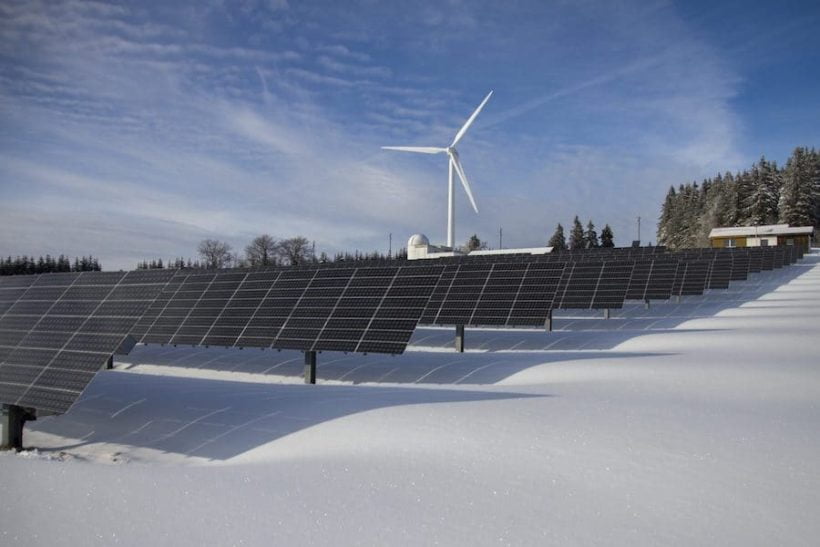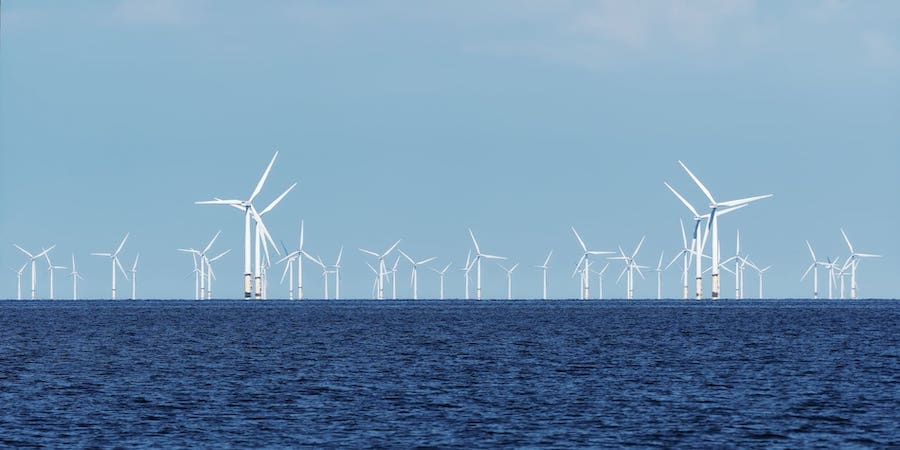A Deep Interview with Mark Irvine, Head of Content, DNV
Hello Mark, please tell me a bit about yourself and your role and connection with DNV
I work at DNV’s headquarters in Oslo, Norway, mainly as ‘head of content’. That mostly means editing and producing our flagship publication – our annual Energy Transition Outlook and its various companion reports (for example 2021 includes reports on key transition technologies; and a Pathway to Net Zero report). Other flagship reports include our Technology Outlook, published every 5 years that looks 10 years ahead across the technology spectrum.

I also edit or contribute to an Ocean Space Forecast (forthcoming) and various other position papers published by our R&D function from time to time. I work directly with the CEO on various communications tasks, and I am currently also part of a small team that has worked on formulating DNV’s strategy for the period through to 2025.
I have worked in DNV for 10 years, mainly in communication-related roles. Prior to that I was a manager and strategist at the Diamond Trading Company in London – the sales and marketing arm of the De Beers Group of companies.
I am dual South African/UK citizen. I have degrees in archaeology (University of Cape Town) and an MBA (Witwatersrand University/Rotterdam School of Management). I am also a member of the branding-with-a-conscience thinktank, Medinge Group.
What is DNV?
DNV is a global risk management and assurance company, which provides certification, verification, testing and inspection, and advisory services across a wide range of industries.
Concretely, assurance means giving confidence that something works as it should work. A few years ago, we merged with Germanischer Lloyd based in Hamburg, and so from 2014 we were branded ‘DNV GL’. However, following a buyout of minority shareholders, the company is now once again fully owned by its original Norway-based foundation, and we rebranded this year as plain ‘DNV’.
DNV is mostly known as a maritime classification society. About one fifth of the world’s fleet of ships, measured by tonnage, is in ‘DNV Class’. As a class society we provide technical know-how and experience in helping the industry and statutory bodies deliver safe and clean shipping. Essentially this means we develop and maintain a set of rules on how ships should be built and maintained, and that involves a great deal of survey work both at shipyards and also for in-service ships at all the major ports around the world.
Over time, DNV has applied its knowledge and services to other industries beyond maritime, most notably the energy industry which is undergoing a major transition. In consequence, our own energy services are transitioning – where we are no longer growing services in upstream oil and gas and concentrating instead on working with the world’s leading energy players who are targeting a faster transition to a decarbonized energy system. DNV has considerable depth of experience in power systems and renewable energy, for example, we are the world’s leading technical advisor in wind power. DNV also has an extensive management system certification business, and we provide assurance services to supply chains in the health and food sector.
Who controls DNV?
DNV is 100% owned by the Norway-based foundation ‘Stiftelsen Det Norske Veritas’, whose purpose is to safeguard life, property and the environment. By extension, that is the purpose of DNV itself.
All the profits are used to enable that purpose. For example, our organisation is competence-based, and we have a big R&D budget enabling us to develop new, cutting-edge services but also ensuring that DNV is a place that gives us the opportunity to engage in life-long learning.
What are the key issues that DNV aims to address?
These are times of rapid change and transformation. We aim to be a trusted voice in relation to these transformations – particularly on digitalization, decarbonization and sustainability.
Our vision is to become a trusted voice on global transformations.
For instance, in the energy sector our services run the full spectrum of decarbonization, up to and including the latest developments in cutting-edge areas like floating offshore wind and hydrogen.
In addition to the very detailed work of technology qualification and advisory, we also aim to provide thought leadership at a systems level – including a detailed forecast of the way in which the global and regional energy systems are transitioning.
Just yesterday, we launched a pathway to net zero report, and the short answer is: a lot needs to be done. In fact, the world needs massive and early action if we are to secure a 1.5-degree future.
One of our key messages in the report is that high-income countries are going to have to reach net zero well before 2050. For example, the US and the EU should target 2042. That is because there are many middle- and lower-income countries that have neither the capacity nor development trajectory to reach net zero in 2050. It is a huge lift for everybody, and everybody needs to contribute.
In our report we describe what we view as an economically and politically feasible path to net zero – but it is a very narrow path! We take a global view and build it up by looking at ten world regions, as well as specific energy demand and supply sectors. Some sectors are more difficult to electrify, aviation being one example. Here, one has to look at alternatives, such as hydrogen or bioenergy. However, a lot of expenses are involved, and often other sustainability concerns arise. Tough choices lie ahead and there is no room for greenwashing. That’s one of the reasons why it is good to work for a company like DNV – we are a strictly science-based business, sticking to facts – we are not in the business of painting green facades on businesses.
Due to our deep technical understanding of energy technologies in particular, we see it as our duty to communicate what we know – while respecting the bounds of proprietary knowledge.
What do you see as the biggest lever in reaching net zero emissions?
The biggest lever in reaching net zero is the potential for the world to electrify.
We have to electrify everything we can and build up the electricity grid – that is the only proper way to decarbonize our energy system.
In this endeavour, governments and technology play an equal role.
Governments can guide developments by applying a price to carbon, applying taxes to aviation fuels or incentivizing the transition to electric vehicles through tax breaks. Reaching net zero will inevitably involve tougher policies too like bans and mandates. This is specifically important but complicated for democracies due to various trade-offs, as some policies may prove unpopular.
At the same time, it is infeasible to completely get rid of fossil fuels in the energy mix by 2050, roughly 1/5 of which will still be fossil fuels of some kind. Therefore, carbon capture and removal must play a role, despite the misgivings of some environmentalists towards CCS.
What would you say makes assurance and risk management so essential, especially in today’s age?
One of the characteristics of this modern world is that it’s digitizing at a greater speed than most people realize. This opens an enormous potential in efficiencies, connectivity and convenience. At the same time, great risks build up.
With technologies like AI, you need to be able to trust the underlying algorithms and it creates a difficult issue: Who is taking the decisions, for instance for autonomous vehicles? Where is the agency involved?
We take a holistic view around assurance of digital assets, focused not just on the narrow (but critical) issues of data integrity and algorithm functionality, but also looking at machine/human interactions and the social context in which these assets are deployed, and the ethics involved.
How has DNV’s mission evolved since its creation in 1864?
Our purpose has remained the same over the last 150 plus years, but our mission has evolved. Over time we have encompassed more industries other than shipping, and while our focus is primarily on safety, our focus on the environmental impact and consequences of these industries has deepened and broadened. As DNV explains in its Technology Outlook 2030 publication, the Sustainable Development Goals that focus on planetary boundaries – climate, water and biodiversity – are the foundation for all other industry and social based goals.

According to its website, DNV is set to become climate net positive by 2025. What are some of the main measures to achieve this goal?
What that means in practice is that by 2025 we aim for our operations to be entirely supplied by renewable electricity. We will also reduce travel-related emissions by 50% compared with 2019. We will offset the remaining emissions, but we are also working with partners to explore projects to remove carbon from the atmosphere. We haven’t published details on those projects yet.
What are the ways in which DNV can help its customers decarbonize?
Our own carbon footprint is relatively insignificant, and so we have a far greater impact on decarbonization through the services and advice we provide to our customers. This involves positioning DNV as a trusted and leading voice on decarbonization – for example, around alternative fuels in the maritime sector, as well as the costs and risks involved. We are working with leading energy customers and helping them with services and advice that will help them fulfil their stated ambitions to transition faster to low- and zero-carbon options. I think one area that is often overlooked is the critical role of energy efficiency, which is probably the greatest resource the world has in leveraging change in line with the Paris Agreement. That does not contract what I said earlier about the central role of electricity – energy efficiency and electricity are intertwined. So, our services, for example, to maritime customers, on energy efficiency enhancements are important in that regard.
How does DNV understand sustainability in the oil and gas industry? Is there any tension between your organization and the Norway Government -considering that the country is among the 10 largest global exporters of oil and gas-?
DNV is not a political organisation, and we are not responsible for the government’s decisions. But when we are asked for advice, we give it. For example, we have been commissioned by the Federation of Norwegian Industries to produce an energy transition report for Norway. There, we look at Norway’s stated decarbonization targets, and conclude that the country is not on track to meet those targets. We outline what is required therefore to meet them. In a separate report – the Pathway to Net Zero I spoke about earlier – we repeat the IPCC conclusions that to secure a 1.5-degree future, the world has to reach net zero emissions by 2050. Amongst other things, that means that for high-income countries, no new oil and gas fields will be needed after 2024 – and that is something that Norway is going to have to consider very carefully.
How is the digital transformation of your own organization and other businesses connected to sustainability?
Digital transformation is an enabler of efficiency.
At DNV, we have to hold two thoughts at the same time on digitalization: providing assurance on the digital assets of our customers, and also making sure that we are developing our own digital assets to make our assurance work efficient.
During the pandemic, we greatly accelerated more remote surveying methods with cameras and secure video feeds and so on.
Moreover, we are deeply involved with sensors and their associated data and also apply technologies like blockchain in supply chain assurance to enhance transparency. But the bottom line, ultimately, is that digitalization is an enabler of efficiency. It is one of the key mechanisms for reducing the world’s energy intensity (measured as unit of energy per dollar of GDP), which underpins the energy transition.
Can you explain to me the purpose of DNV Ventures, set up in 2020? What are some examples for start-ups you invest in?
We set up DNV Ventures in 2020 with the objective of shaping the next generation of data science applications and digitalised services. We are specifically interested in those applications and services which help to tackle global transformation – in other words in line with our own vision. We have made several venture investments in the last 2 years, and for details about how DNV Venture works, I refer you to our website. The start-ups we support are of relevance to our core work, and we have a lot of digitized businesses in our portfolio. But I must add that from my perspective I think corporate venturing is a great way of injecting back into our organisation critical learnings about agility, speed and design thinking. It is also a way of reaching out to the next generation, specifically Generation Z, which is now widely being labelled the “entrepreneurial generation”.

Gen Z is the entrepreneurial generation, and it is essential to develop relations with them.
Nowadays, the cost of starting businesses is lower and there is a higher power of connectivity which enables efficiencies for young people to try out new ideas and new ways of working.
We want to tap into that and accelerate our own ideas as well as listen to their ideas.





Interesting article, and very complex business! But their impact on sustainability in other companies is definitely not tiny, so great to read about their commitments and sustainability focus.
And very sensitive… DNV works with companies in the energy sector, including Oil & Gas operations.
What an insightful interview! Great to learn about how DNV works, what they do and how they make a difference.
Yes! Mark is amazing and what DNV is doing too!
Actually, its not that mind-blowing. DNV is a well-known certification body in the industry. Their role and control are pretty standard for organizations like theirs. Maybe you should do some more research before making such comments. Just saying.
Marks insights on DNVs role are intriguing. Who really controls DNV though?
Marks insights on DNV are intriguing. Who really controls this influential entity?
Is DNV truly a trusted voice in these fast-paced times? Lets discuss!
DNV has a solid reputation built on years of expertise and credibility. Their track record speaks for itself. In a world of uncertainty, DNV remains a trusted voice providing valuable insights and guidance. Lets not underestimate the value of experience in these fast-paced times.